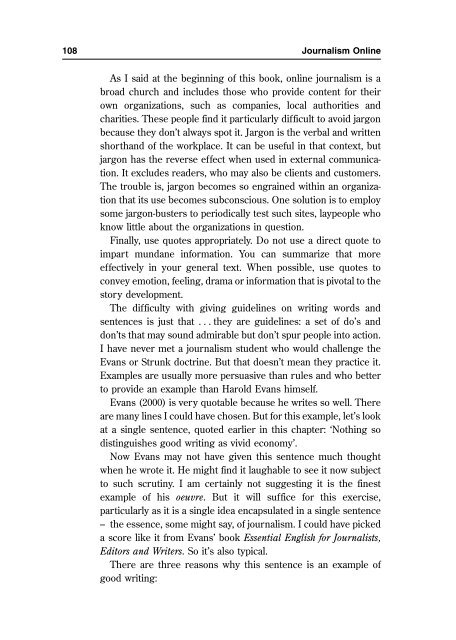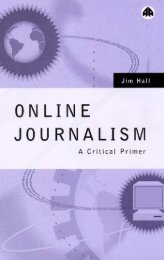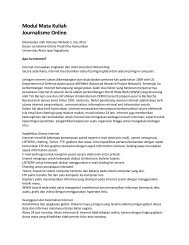1What is online journalism? - Ayo Menulis FISIP UAJY
1What is online journalism? - Ayo Menulis FISIP UAJY
1What is online journalism? - Ayo Menulis FISIP UAJY
You also want an ePaper? Increase the reach of your titles
YUMPU automatically turns print PDFs into web optimized ePapers that Google loves.
108 Journal<strong>is</strong>m Online<br />
As I said at the beginning of th<strong>is</strong> book, <strong>online</strong> journal<strong>is</strong>m <strong>is</strong> a<br />
broad church and includes those who provide content for their<br />
own organizations, such as companies, local authorities and<br />
charities. These people find it particularly difficult to avoid jargon<br />
because they don’t always spot it. Jargon <strong>is</strong> the verbal and written<br />
shorthand of the workplace. It can be useful in that context, but<br />
jargon has the reverse effect when used in external communication.<br />
It excludes readers, who may also be clients and customers.<br />
The trouble <strong>is</strong>, jargon becomes so engrained within an organization<br />
that its use becomes subconscious. One solution <strong>is</strong> to employ<br />
some jargon-busters to periodically test such sites, laypeople who<br />
know little about the organizations in question.<br />
Finally, use quotes appropriately. Do not use a direct quote to<br />
impart mundane information. You can summarize that more<br />
effectively in your general text. When possible, use quotes to<br />
convey emotion, feeling, drama or information that <strong>is</strong> pivotal to the<br />
story development.<br />
The difficulty with giving guidelines on writing words and<br />
sentences <strong>is</strong> just that . . . they are guidelines: a set of do’s and<br />
don’ts that may sound admirable but don’t spur people into action.<br />
I have never met a journal<strong>is</strong>m student who would challenge the<br />
Evans or Strunk doctrine. But that doesn’t mean they practice it.<br />
Examples are usually more persuasive than rules and who better<br />
to provide an example than Harold Evans himself.<br />
Evans (2000) <strong>is</strong> very quotable because he writes so well. There<br />
are many lines I could have chosen. But for th<strong>is</strong> example, let’s look<br />
at a single sentence, quoted earlier in th<strong>is</strong> chapter: ‘Nothing so<br />
d<strong>is</strong>tingu<strong>is</strong>hes good writing as vivid economy’.<br />
Now Evans may not have given th<strong>is</strong> sentence much thought<br />
when he wrote it. He might find it laughable to see it now subject<br />
to such scrutiny. I am certainly not suggesting it <strong>is</strong> the finest<br />
example of h<strong>is</strong> oeuvre. But it will suffice for th<strong>is</strong> exerc<strong>is</strong>e,<br />
particularly as it <strong>is</strong> a single idea encapsulated in a single sentence<br />
– the essence, some might say, of journal<strong>is</strong>m. I could have picked<br />
a score like it from Evans’ book Essential Engl<strong>is</strong>h for Journal<strong>is</strong>ts,<br />
Editors and Writers. So it’s also typical.<br />
There are three reasons why th<strong>is</strong> sentence <strong>is</strong> an example of<br />
good writing:
















